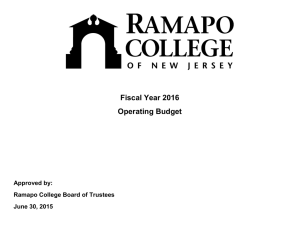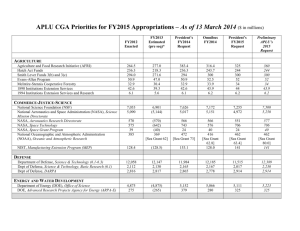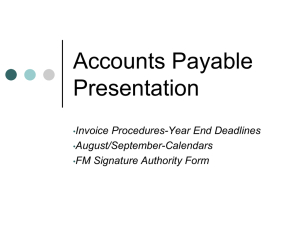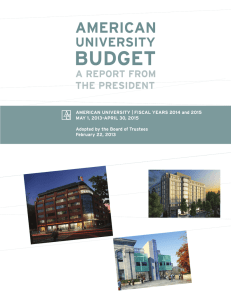Fiscal Year 2015 Operating Budget Approved by:
advertisement
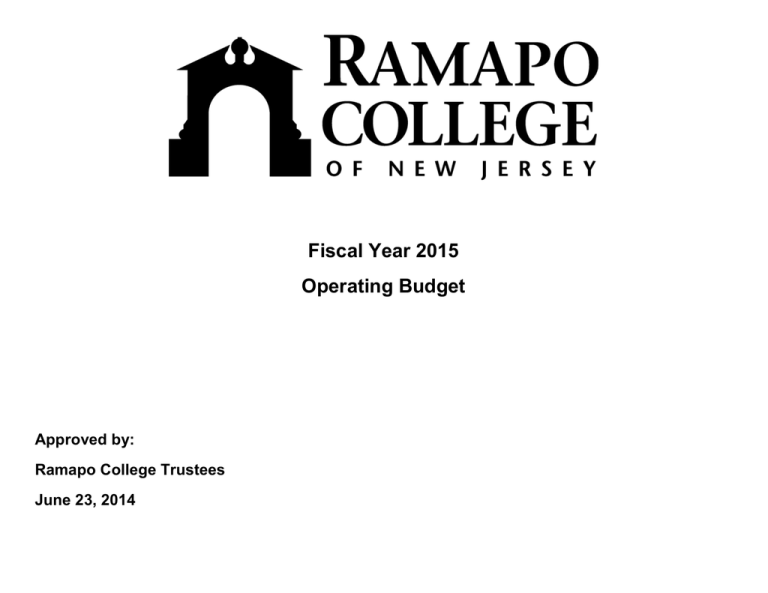
Fiscal Year 2015 Operating Budget Approved by: Ramapo College Trustees June 23, 2014 Board of Trustees George C. Ruotolo, Jr. Chair William F. Dator Vice Chair David G. Schlussel Secretary Kevin Ng Student Trustee Vincent Colman Peter McBride Gary L. Montroy A.J. Sabath Thomas A. Zelante, Esq. President Peter P. Mercer Executive Summary This executive summary provides a brief overview of Ramapo College’s operating plan and projected sources and expenditure of funds for the fiscal year beginning July 1, 2014 and ending June 30, 2015. The operating budget was developed to support the vision of Ramapo College and is aligned with the Strategic Plan of the College. As the College continues to link the budget process to planning, the administration remains committed to managing resources effectively. Pressures and demands have grown over the past decade while direct state support has remained flat with rising costs. The College will persist in its efforts to carefully review expenditures and reallocate resources where necessary in order to meet its strategic planning goals. Throughout the year, budgets are monitored to ensure that expenditures do not exceed authorized amounts and are used for intended purposes. The College maintains an online budgetary control system (Ellucian Banner) to assist unit directors with the management of their accounts. Approval of the budget and setting of tuition and fees is ratified by the Ramapo College Board of Trustees who constitutes authority for the administration to expend funds within the total dollar limit of the approved budget. The Fiscal 2015 Budget The operating budget of $152 million is an increase of $4 million over FY2014, which represents a 2.8% increase. Additional cost factors include bargaining unit contracts and employee fringe benefit expenses. The Administration continues to effectively adjust spending in order to balance the budget and keep tuition and fee increases at a reasonable level. The Board of Trustees approved no increases in tuition and fees, housing and board charges. The increase of 15.4% in institutional support expenses was due to the reallocation of SPIF and Inflationary funding from other program reserves, and the addition of the Government Relations and General Counsel departments to the Institutional Support budget. Ramapo’s base state appropriation of $16.1M remains the same for FY2015. The additional revenue in state fringe benefits of $2.7M is offset by an increase to the fringe benefits expense. In FY2015, the state support will fund approximately 28.4% of our total operating budget, while student tuition and fees funds approximately 43.4%. A major cost savings initiative in the FY2015 budget was the defeasance of the 2003H and 2004E bond series, resulting in a savings of $3.5M. Other assumptions that were incorporated into the FY2015 base operating budget include: • • • Salary step / increments for union employees Funding for top priorities to meet our strategic planning initiatives Inflationary increases The following pages provide some of the highlights of the FY2015 operating budget. Where the Money Comes From Ramapo’s operating budget has five (5) major sources of funding. Sources of FY2015 Revenues Auxiliary 26.5% • State appropriation – includes direct state support and state funded fringe benefits State Support 28.4% • Net tuition • Fees • Auxiliary – self-supporting activities that includes student housing charges, meal plan, bookstore, student activity and student center fees • Other sources – includes interest income and other miscellaneous sources Other 1.7% Fees 12.8% Net Tuition 30.6% Revenue Budget Summary FY2014 vs. FY2015 ($) in Millions FY2014 FY2015 Amt Diff. % Diff Educational & General Revenues Direct State Appropriation $ 16,130 $ 16,130 $ - 0.0% State Funded Fringe Benefits $ 24,363 $ 27,145 $ 2,782 11.4% Net Tuition $ 45,123 $ 46,804 $ 1,681 3.7% Student Fees $ 19,264 $ 19,550 $ 286 1.5% Other Sources $ 2,591 $ 2,381 $ (210) -8.1% Interest Income $ 200 $ 200 $ - 0.0% Total Educational & General Revenues $ 107,671 $ 112,210 $ 4,539 4.2% Auxiliary Services $ 40,755 $ 40,389 $ (366) -0.9% Total Revenue $ 148,426 $ 152,599 $ 4,173 2.8% What the Operating Budget Funds Expenditures by Program Debt Service 11.4% Auxiliary Svcs 16.2% Physical Plant 11.7% Institutional Support 14.4% Expenditures by Category Instruction 32.4% Other 11.3% Academic Support 4.8% Debt Service 11.4% Student Services 9.1% • 37.2% funds academic activities such as instruction, advising, and library. • Debt makes up 11.4% of the operating budget, a decrease from FY2014 due to defeasance of bonds. Contracted & Professional 8.8% Fuel & Utilities 3.4% Maintenance & Capital Improv. 2.6% Salaries and Benefits 62.5% • Salaries and benefits make up the majority of the budget at 62.5%. • The operating budget has very little discretionary non-fixed costs. • Other includes materials, supplies, and services. Expenditure Budget Summary FY2014 vs. FY2015 ($) in Millions FY2014 FY2015 Amt Diff. % Diff Educational & General Expenditures Instruction $ 46,953 $ Academic Support $ 6,983 $ 7,326 $ 343 4.9% Student Services $ 13,153 $ 13,746 $ 593 4.5% Institutional Support $ 19,075 $ 22,011 $ 2,936 15.4% Physical Plant $ 16,826 $ 17,807 $ 981 5.8% Financial Aid & Scholarships $ 211 $ 205 $ (6) -2.8% Total Educational & General Expenditures $ 103,201 $ 110,544 $ 7,343 7.1% Auxiliary Expenditures $ 24,251 $ 24,675 $ 424 1.7% Debt Service-Educational & General $ 7,944 $ 8,122 $ 178 2.2% Debt Service-Auxiliary $ 13,030 $ 9,258 $ (3,772) -28.9% Total Debt Service Expenditures $ 20,974 $ 17,380 $ (3,594) -17.1% Total Expenditures $ 148,426 $ 152,599 $ 4,173 2.8% 49,449 $ 2,496 5.3% Cost Saving Initiatives • The College has been able to contain costs, reduce expenditures, and reallocate resources. • Cost containment is vital to our budget process for future strategic investments. • Debt reduction due to defeasance of bonds. • Other cost savings initiatives: a. utility costs reduction b. salary elimination/ defer hiring c. across the board non salary cuts d. other expenses (SPIF, reserves) Tuition and Fees The FY2015 budget is based on the annualized undergraduate tuition and fee rates. FY2014 Rate FY2015 Rate $ Increase % Increase In-State Tuition Fees Capital Improvements Fee Sub Total $ 8,650.00 $ 3,738.00 $ 1,000.00 $ 13,388.00 $ 8,650.00 $ 3,738.00 $ 1,000.00 $13,388.00 $0.00 $0.00 $0.00 $0.00 0.0% 0.0% 0.0% 0.0% Housing (Mackin Triple ) Board (Super 14 Plan) $ 8,180.00 $ 3,450.00 $ 8,180.00 $ 3,450.00 $0.00 $0.00 0.0% 0.0% Total In-State Resident $ 25,018.00 $25,018.00 $0.00 0.0% Out-of-State Tuition Fees Capital Improvements Fee Sub Total $ 17,300.00 $ 3,738.00 $ 1,000.00 $ 22,038.00 $17,300.00 $ 3,738.00 $ 1,000.00 $22,038.00 $0.00 $0.00 $0.00 $0.00 0.0% 0.0% 0.0% 0.0% Housing (Mackin Triple) Board (Super 14 Plan) $ 8,180.00 $ 3,450.00 $ 8,180.00 $ 3,450.00 $0.00 $0.00 0.0% 0.0% Total Out-of-State Resident $ 33,668.00 $33,668.00 $0.00 0.0%
